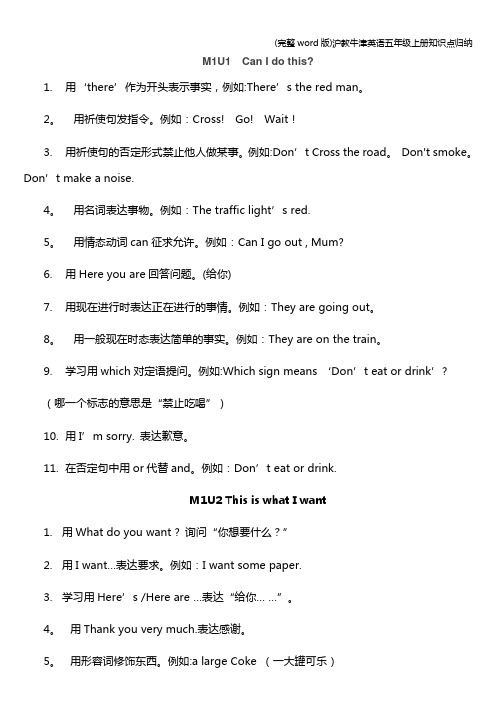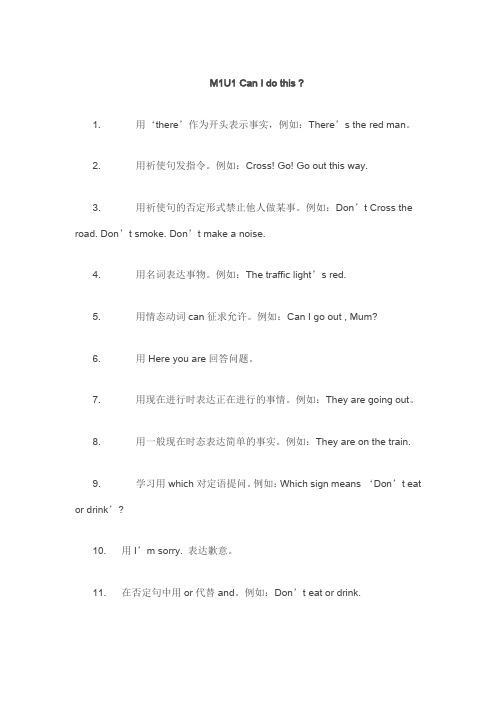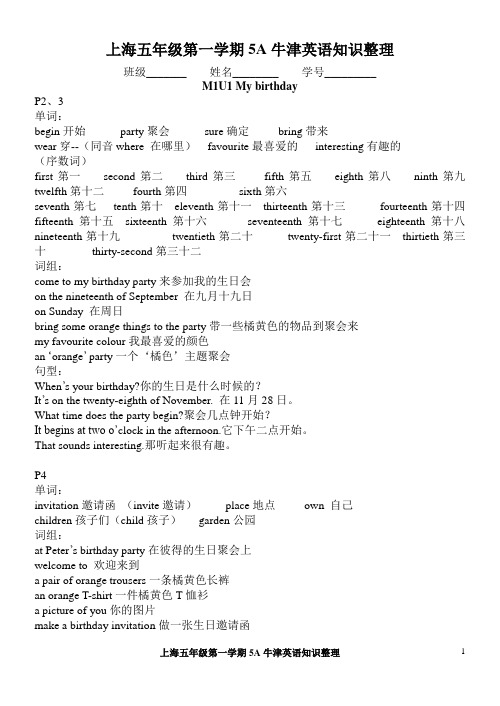上海牛津版英语5A-M1U1知识点
(完整word版)沪教牛津英语五年级上册知识点归纳

M1U1 Can I do this?1. 用‘there’作为开头表示事实,例如:There’s the red man。
2。
用祈使句发指令。
例如:Cross! Go! Wait!3. 用祈使句的否定形式禁止他人做某事。
例如:Don’t Cross the road。
Don't smoke。
Don’t make a noise.4。
用名词表达事物。
例如:The traffic light’s red.5。
用情态动词can征求允许。
例如:Can I go out , Mum?6. 用Here you are回答问题。
(给你)7. 用现在进行时表达正在进行的事情。
例如:They are going out。
8。
用一般现在时态表达简单的事实。
例如:They are on the train。
9. 学习用which对定语提问。
例如:Which sign means ‘Don’t eat or drink’?(哪一个标志的意思是“禁止吃喝”)10. 用I’m sorry. 表达歉意。
11. 在否定句中用or代替and。
例如:Don’t eat or drink.M1U2 This is what I want1. 用What do you want ? 询问“你想要什么?”2. 用I want…表达要求。
例如:I want some paper.3. 学习用Here’s /Here are …表达“给你… …”。
4。
用Thank you very much.表达感谢。
5。
用形容词修饰东西。
例如:a large Coke (一大罐可乐)6。
用情态动词can征求许可。
例如:Can I have some fish,please?7。
学习关于菜的名称。
例如:noodles、vegetablesM1U3 This is what I need1。
关于学习用品的单词。
例如:books.2。
用’What do you need for school ?' 询问“你上学需要什么?"3。
5A上海牛津英语M1U1(新版本)

Module 1Unit 1 Can II do this?本课重点是现在进行时现在进行是由be+doing构成的。
其中bef动词根据主语作相应变化。
现在进行时的否定形式是be动词后加not.Look and read (On the underground) 栏目中,be going to (正在去某地), be waiting for (正在等候), be not eating and drinking (没在吃和喝),be going out (正在出去) 是现在进行时的用法。
课文中What are they saying? (他们正在说什么?) 是现在进行时的特殊疑问句。
Look and say (At home) 和Ask and answer 栏目是复习操练can 引起的一般疑问句和它的省略回答。
由which 引起的特殊疑问句可以是which作疑问词,也可以由which+名词作疑问词。
例:I have three books. Which (one) do you like? 我有三本书,你喜欢哪一本?Which skirt do you like? 你喜欢哪条裙子?学习目标1. 核心词汇cross v. 横穿mean v. 意思是sign n. 标志smoke V.吸烟station n.车站traffic light 交通灯注意or 意思是“或者”时是转折连词。
例:underground n.地铁which n./adj.哪一个2、其它词汇drink v.喝road n. 马路way n.路线rubbish n.垃圾or conj.或者3. 词汇学习1) station (车站), 同义词stop (车站)。
它们的区别在于station指的大车站,如underground station (地铁站), stop 指小车站, bus stop (公交车站)2) which (哪一个)和what (什么) 都是疑问词, 放在句首构成特殊疑问句.注意,W hich是指“(一定范围中的)哪一个”, what的意思是“什么”,没有范围限制。
牛津上海版五年级上册英语5A Module 1- Module 2 重点句型及语法点汇总

上海沪教版5A 期中重点句型&语法总结M1U11.When is your birthday?It’s on …..2.What time is it?It’s…….3.That sounds interesting.I can’t wait.4.Welcome to……5.What do you have?I have……6.It’s a picture of you7.Let’s have some fun.语法考察点:1.基数词变序数词的规律,2.月份日期的正确书写与表达,时间介词的使用3.现在进行时的基本形式,用法以及使用标志,M1U21.Ben rides his bike to school.=Ben goes to school by bike.2.She/He always/never walks.3.How do you come to school?I come to school by….4.where do you cross the road/ How do you cross the road?5.That’s correct.6.I leave home at a quarter to eight.7.I don’t live school. I come to school by bus.语法考察点:1.祈使句表达交通规则2.频度副词的程度:always(100%)>usually(80%)>often(60%)>sometimes(40%)>seldom(20%)>hardly(5%)>rarely never(0%)习惯上位于系动词、助动词、情态动词之后,行为动词之前。
3.用特殊疑问句表达如何上学以及回答如何遵守交通规则4.如何表示时间,①所有的时间都可以用“小时+ 分钟”;②如果所表述的时间在半小时之内,可以用“分钟+ past + 小时”;③如果所表述的时间在半小时之外,可以用“(相差的)分钟+ to + (下一)小时”M1U31.what do you want to be?I want to be a/an ……2.I am from Rainbow Primary School.3.Can I ask you some question?Of course.4.What’s your job?/ What do you do?My job is…../I am a/an…..5.He wants to fly a aeroplane, but he is afraid of flying.6.He wants to be a star. But he is not good at singing.语法考察点:1.运用want to do询问别人梦想工作及回答,want to do/want sth.2.询问别人工作及回答,what’s your job/what do you do?3.like用法,①like+sb./sth.“喜欢某人/某物”;②like doing sth.“喜欢做(某事)”;③like sb.to do (sth)“想要某人做(某事)”;④like 作介词,意为“像……”,在句中一般作状语或表语.M2U11.How often do you visit them?I visit them once a week.2.what do you do with them?I often play chess with my grandfather.3.who’s there?4.Your grandchild .Little Red Riding Hood.5.Grandma,what strong arms you have.6.Are you all right?I am OK. Thank you.语法考察点:1.多久一次how often的用法2.表达频率的词组,如次数超过两次时用基数词加次数(times)组成,once,twice特殊记3.What 引导的感叹句,与how引导的感叹句的对比M2U21.We both like sports.2.We both like helping people.3.We like each other and we like to be together4.It is a different match for both teams.5.We don’t have any water.6.Don’t worry7.I am Tony from Room 5068.I like running and football. How about you?9.I have a good friend called Brett.10.She’s happy like a bee语法考察点:1.both 和all 的用法区别,both指两者都,all指三者或以上。
上海版牛津英语5A教材复习要点汇总

M1U1 Can I do this ?1. 用‘there’作为开头表示事实,例如:There’s the red man。
2. 用祈使句发指令。
例如:Cross! Go! Go out this way.3. 用祈使句的否定形式禁止他人做某事。
例如:Don’t Cross the road. Don’t smoke. Don’t make a noise.4. 用名词表达事物。
例如:The traffic light’s red.5. 用情态动词can征求允许。
例如:Can I go out , Mum?6. 用Here you are回答问题。
7. 用现在进行时表达正在进行的事情。
例如:They are going out。
8. 用一般现在时态表达简单的事实。
例如:They are on the train.9. 学习用which对定语提问。
例如:Which sign means ‘Don’t eat or drink’?10. 用I’m sorry. 表达歉意。
11. 在否定句中用or代替and。
例如:Don’t eat or drink.M1U2 This is what I want1. 用What do you want ?询问“你想要什么?”2. 用I want…表达要求。
例如:I want some paper.3. 学习用Here’s /Here are …表达“给你……”。
4. 用Thank you very much.表达感谢。
5. 用形容词修饰东西。
例如:a large Coke6. 用情态动词can征求许可。
例如:Can I have some fish, please?7. 学习关于菜的名称。
例如:noodles vegetablesM1U3 This is what I need1. 关于学习用品的单词。
例如:books。
2. 用’What do you need for school ?’询问“你上学需要什么?”3. 用We need …表达“我们需要……”。
牛津英语上海版各单元重点单词词组句子总结

M1U1 Using my five senses一、核心词汇school bag brush paints crayon notebook glue书包刷子绘画颜料蜡笔笔记本胶水tape put mine yours theirs hers ours his胶带放我的你的他们的她的我们的他的二、其它词汇storybook scarf glove shoe nail magic sharp soon故事书围巾手套鞋钉子神奇的尖的不久magnet again stone workshop smooth hard should磁铁再一次石头工作间光滑的硬的应该三、词组tidy up the room put it in Mum and Dad’s bedroom打扫房间把它放到爸爸和妈妈的卧室fall onto the floor give him a black stone be careful 掉到地板上给他一块黑色的石头小心try this stone stick to the stone尝试这块石头粘到石头上四、句子1、Whose school bag is this?这是谁的书包?2、It’s mine.这是我的.3、What a mess! 多么乱啊!M1U2 Watch it grow!一、核心词汇egg cocoon caterpillar chicken duckling puppy 蛋、卵茧毛虫鸡.鸡肉小鸭子小狗grow fly was were生长飞 is的过去式 are的过去式二、其它词汇interesting insect leaf-leaves silkworm有趣的昆虫树叶蚕bright tail turtle moth lay明亮的尾巴乌龟飞蛾产卵四、词组come out lay eggs play happily be born in ariver出来产卵(生蛋)开心的玩出生在河里catch flies have no tail make a lot of silk like eating leaves捉苍蝇没有尾巴吐出很多丝喜欢吃树叶五、句子1、It was a white egg.Now it is a green caterpillar.它曾经是个白色的卵。
牛津上海版五年级上册英语5A Module 1- Module 2 重点句型及语法点汇总

上海沪教版5A 期中重点句型&语法总结M1U11.When is your birthday?It’s on …..2.What time is it?It’s…….3.That sounds interesting.I can’t wait.4.Welcome to……5.What do you have?I have……6.It’s a picture of you7.Let’s have some fun.语法考察点:1.基数词变序数词的规律,2.月份日期的正确书写与表达,时间介词的使用3.现在进行时的基本形式,用法以及使用标志,M1U21.Ben rides his bike to school.=Ben goes to school by bike.2.She/He always/never walks.3.How do you come to school?I come to school by….4.where do you cross the road/ How do you cross the road?5.That’s correct.6.I leave home at a quarter to eight.7.I don’t live school. I come to school by bus.语法考察点:1.祈使句表达交通规则2.频度副词的程度:always(100%)>usually(80%)>often(60%)>sometimes(40%)>seldom(20%)>hardly(5%)>rarely never(0%)习惯上位于系动词、助动词、情态动词之后,行为动词之前。
3.用特殊疑问句表达如何上学以及回答如何遵守交通规则4.如何表示时间,①所有的时间都可以用“小时+ 分钟”;②如果所表述的时间在半小时之内,可以用“分钟+ past + 小时”;③如果所表述的时间在半小时之外,可以用“(相差的)分钟+ to + (下一)小时”M1U31.what do you want to be?I want to be a/an ……2.I am from Rainbow Primary School.3.Can I ask you some question?Of course.4.What’s your job?/ What do you do?My job is…../I am a/an…..5.He wants to fly a aeroplane, but he is afraid of flying.6.He wants to be a star. But he is not good at singing.语法考察点:1.运用want to do询问别人梦想工作及回答,want to do/want sth.2.询问别人工作及回答,what’s your job/what do you do?3.like用法,①like+sb./sth.“喜欢某人/某物”;②like doing sth.“喜欢做(某事)”;③like sb.to do (sth)“想要某人做(某事)”;④like 作介词,意为“像……”,在句中一般作状语或表语.M2U11.How often do you visit them?I visit them once a week.2.what do you do with them?I often play chess with my grandfather.3.who’s there?4.Your grandchild .Little Red Riding Hood.5.Grandma,what strong arms you have.6.Are you all right?I am OK. Thank you.语法考察点:1.多久一次how often的用法2.表达频率的词组,如次数超过两次时用基数词加次数(times)组成,once,twice特殊记3.What 引导的感叹句,与how引导的感叹句的对比M2U21.We both like sports.2.We both like helping people.3.We like each other and we like to be together4.It is a different match for both teams.5.We don’t have any water.6.Don’t worry7.I am Tony from Room 5068.I like running and football. How about you?9.I have a good friend called Brett.10.She’s happy like a bee语法考察点:1.both 和all 的用法区别,both指两者都,all指三者或以上。
上海五年级第一学期5A牛津英语知识整理

上海五年级第一学期5A牛津英语知识整理班级_______ 姓名________ 学号_________M1U1 My birthdayP2、3单词:begin开始party聚会sure确定bring带来wear穿--(同音where 在哪里)favourite最喜爱的interesting有趣的(序数词)first第一second第二third第三fifth第五eighth第八ninth第九twelfth第十二fourth第四sixth第六seventh第七tenth第十eleventh第十一thirteenth第十三fourteenth第十四fifteenth第十五sixteenth第十六seventeenth第十七eighteenth 第十八nineteenth第十九twentieth第二十twenty-first第二十一thirtieth第三十thirty-second第三十二词组:come to my birthday party来参加我的生日会on the nineteenth of September 在九月十九日on Sunday 在周日bring some orange things to the party带一些橘黄色的物品到聚会来my favourite colour我最喜爱的颜色an ‘orange’ party一个‘橘色’主题聚会句型:When’s your birthday?你的生日是什么时候的?It’s on the twenty-eighth of November. 在11月28日。
What time does the party begin?聚会几点钟开始?It begins at two o’clock in the afternoon.它下午二点开始。
That sounds interesting.那听起来很有趣。
P4单词:invitation邀请函(invite邀请)place地点own 自己children孩子们(child孩子)garden公园词组:at Peter’s birthday party在彼得的生日聚会上welcome to 欢迎来到a pair of orange trousers一条橘黄色长裤an orange T-shirt一件橘黄色T恤衫a picture of you你的图片make a birthday invitation做一张生日邀请函句型:What orange things do you have?你有什么橘色物品?I have an orange hat.我有一顶橘色帽子。
上海小学牛津英语5AM1知识点整理(含写作例文)

Module 1 Getting to know youUnit 1 My birthday一、核心词汇1.first第一2.second第二3.third第三4.fourth第四5.fifith第五6.sixth第六7.seventh第七8.eighth第八9.ninth第九10.tenth第十11.eleventh第十一12.twelfth第十二13.twentieth第二十14. thirtieth第三十15. smart 漂亮的,帅气的16.party派对,聚会17.begain开始18.present礼物19.bring带来20.sound 听起来21.favourite最喜欢的22.invitation邀请23.interesting有趣的二、词组/短语1. at Peter’s birthday party在Peter的生日聚会上2. on the 19th of September在9月19日3.on Sunday在周日4.at two o’clock在两点5. in the afternoon在下午6. at night在晚上7. sb. be tired某人很累8. my favourite color我最喜欢的颜色9. That sounds interesting.那听上去有趣10. I can’t wait!我等不及了!11. Happy Birthday! 生日快乐12. Welcome to my party. 欢迎来我的派对13. a pair of orange trousers一条橙色的裤子14. make a birthday invitation制作一张生日请帖15. make a hat制作一顶帽子16. have some fun过得高兴17. birthday present生日礼物三、词汇解释1.bring,take,carry辨析bring是指把人或物从别处带到说话人所在的地方。
- 1、下载文档前请自行甄别文档内容的完整性,平台不提供额外的编辑、内容补充、找答案等附加服务。
- 2、"仅部分预览"的文档,不可在线预览部分如存在完整性等问题,可反馈申请退款(可完整预览的文档不适用该条件!)。
- 3、如文档侵犯您的权益,请联系客服反馈,我们会尽快为您处理(人工客服工作时间:9:00-18:30)。
5A M1U1必背必默内容【单词】
first第一second第二third第三fourth第四fifth第五sixth第六seventh第七eighth第八ninth第九tenth第十eleventh第十一twelfth第十二twentieth第二十
twenty-first第二十一
thirtieth第三十
begin开始
present礼物
welcome to欢迎
still仍然
smart漂亮的
invitation邀请
party聚会
bring带来
wear穿
sound声音
favourite喜欢
when什么时候
interesting有趣的
building建筑物
busy忙碌的
son儿子
late迟的
work工作
next下一个
ask问
answer回答
drill钻头/操场
easy容易的
bean豆
bin垃圾箱
seat座位
least最小/少的
list目录
leave离开
or或者
【词组】
on Sunday在周日
on the19th of September在9月19日what time什么时间
at two o'clock在二点钟
bring...to.....把……带来….
can't wait等不及
a picture of you一张你的图片
make a birthday invitation做一张生日邀请卡birthday present生日礼物
make a hat做帽子
next morning第二天早晨
a smart new hat一顶漂亮的新帽子on his bed在他的床上
ask his father问他的父亲
come first第一个来
still working仍然工作
【句子】
When is your birthday?It's on the19th of September.
你什么时候生日。
在9月19日。
What time does the party begin?It begins at two o'clock in the afternoon.
晚会什么时间开始?在下午2点开始。
What orange things do you have?I have an orange hat.
你都有些什么桔色的东西?我有一顶桔色的帽子。
Mr.Hatter is very tired,but he is still working.
先生很累了,但仍然在工作。
Welcome to my birthday party.欢迎来我的生日聚会。
It sounds interesting.I can't wait.听起来很有趣。
我等不及了。
Can you bring or wear some orange things to the party?
你能带或穿一些桔色的东西来玩会吗?
Let's have some fun.我们来玩吧。
月份
January一月Jan.
February二月Feb.
March三月Mar.
April四月Apr.May五月
May
June六月
Jun.
July七月
Jul.
August八月
Aug.
Septembe r九月
Sep.
October十月
Oct.
November十一月
Nov.
December十二月
Dec.。
